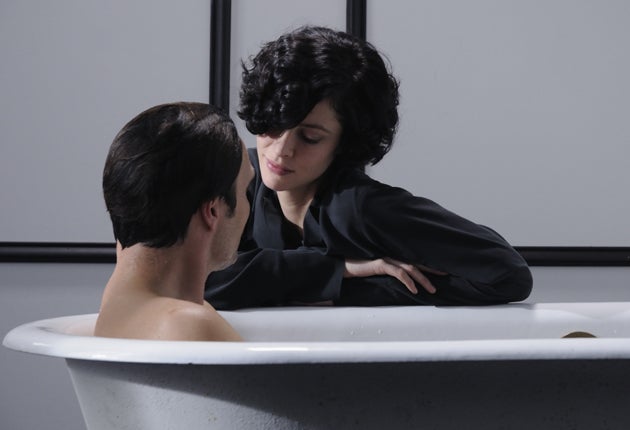Coco Chanel & Igor Stravinsky, Jan Kounen, 118 mins (15)<br/>Undertow, Javier Fuentes-Leon, 100 mins (15)
I say, Coco, would you mind turning off the cold tap?

Almost precisely a year after Coco Before Chanel, here comes a second film about Gabrielle "Coco" Chanel.
The poster even trumpets that it's "from the producer of Amélie", presumably in the hope that someone will make a subliminal connection to Audrey Tautou and imagine that they're watching an official part deux. Don't be fooled. Coco Chanel & Igor Stravinsky picks up, coincidentally, from where Coco Before Chanel left off, but it's a separate enterprise, and Chanel is played by Anna Mouglalis.
When we first see her, it's 1913, and she's on her way to the debut performance of Stravinsky's radical ballet, The Rite of Spring. The orchestra is soon drowned out by catcalls and fist fights, and when we catch up with Stravinsky (Casino Royale's Mads Mikkelsen) in 1920, he's fallen on hard times. Chanel invites him to stay in her villa near Paris, along with his wife, Catherine, and several little Stravinskys. The theory is that he'll be able to compose in comfort, while Chanel gets on with refining her signature perfume. But she's soon interrupting his labours to demonstrate how easy it is to unbutton the dresses she's designed, leading Stravinsky's wife, elsewhere in the villa, to wonder why his piano-playing keeps breaking off mid-bar.
Before becoming an actress, Mouglalis was a leading Chanel model, and she moves as if she's on a catwalk, her head held high at all times. Whether Coco is upbraiding her shopgirls, or marching into Stravinsky's study for a quickie, she does so with the aloofness of someone who doesn't care about anyone else's feelings, and who doesn't have many feelings of her own. Mikkelsen's Stravinsky at least has the decency to be flustered by his infidelity, but he, too, is so unexpressive that he must have put most of his passion into his work.
The paramours' sangfroid is all very classy, but as the affair continues, we're none the wiser as to what's in it for them beyond the obvious. Did it change them as people? Did it affect their respective creations? Maybe the source novel, Chris Greenhalgh's Coco & Igor, had something to say on the matter. The stylish but standoffish film version isn't much more than 90-year-old celebrity gossip.
For a love triangle with a bit more emotion, see Undertow, the first film from Javier Fuentes-Leon. It's set in a seafront village in Peru, where a fisherman, Miguel (Cristian Mercado) appears to be living in domestic bliss with his heavily pregnant wife (Tatiana Astengo), but actually keeps nipping off to a cave for assignations with a handsome painter, Santiago (Manolo Cardona).
When Santiago drowns in the ocean, and returns as a ghost whom only Miguel can see, the transition is presented without any fanfare or special effects. Like the relationship itself, it's just something that happens. The film's stroke of genius is its mordant observation that, for Miguel, having an invisible boyfriend is an ideal situation. He can finally walk through the village hand in hand with his lover, despite living in a tiny, hidebound community where gossip is rife, and homosexuality is condemned as an affront to Latin machismo.
It's a tender, unforced, well constructed and attractively shot fable about what it means to be a man.
Next Week:
Nicholas sees if Argentine drama, The Secret In Their Eyes, merits its Oscar for Best Foreign Language Film
Also Showing: 08/07/10
Step Up 3D (100 mins, 12A)
Yes, it's yet another breakdancing film, but what distinguishes this one is that the story that fills the gaps between musical numbers is even more bogus than usual. The central issue: can a virtuous New York dance troupe save its cavernous warehouse apartment-cum-rehearsal studio by winning a "battle" against another evil dance troupe? Admittedly, Fred Astaire's plots were hardly naturalistic, but when a film is so obsessed by being urban and authentic, then a scenario as cheesey as this one is hard to take. Still, unlike the makers of the recent British effort, StreetDance, the director is sensible enough to shoot the hoofing sequences without cutting to new angles every few milliseconds.
Cats and Dogs: The Revenge of Pussy Galore 3D (82 mins)
Nine years ago, Cats And Dogs exposed the Cold War raging between our hyper-intelligent household pets. This is a sequel of sorts, although it has a different director, writers, actors and characters – and it's nowhere near as much fun. True, it's had more thought put into it than went into Knight and Day, but the frantic plot, the nasty CGI, the thudding puns, and the substandard 3D soon become exhausting. There's a splendid Roadrunner cartoon beforehand, but it has more laughs than the whole of the main feature.
Eccentricities of a Blonde Haired Girl (64 mins)
This adaptation of Eca de Queiroz's short story was written and directed by the 101-year old Manuel de Oliveira. You could argue that his age isn't relevant, but if it weren't for that talking point, it's difficult to believe that this creaky hour of am-dram would be released. Set in the present day, but with 19th-century language and customs, it's the tale of an accountant who is smitten by the pouting girl who appears at the window across the road from his Lisbon office. She's not eccentric, nor is she particularly blonde.
Join our commenting forum
Join thought-provoking conversations, follow other Independent readers and see their replies
Comments
Bookmark popover
Removed from bookmarks